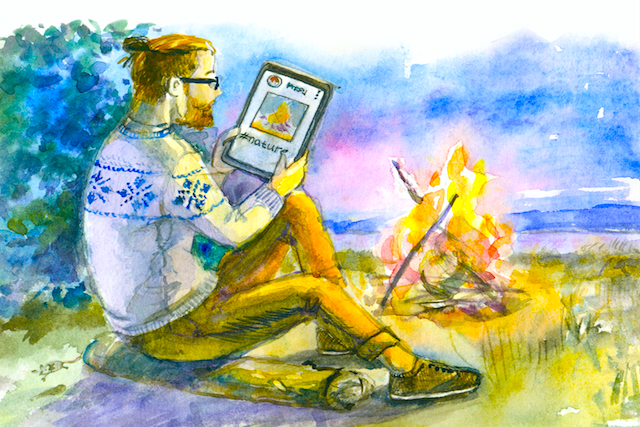
“Sometimes doing less is more than enough.” ~Kris Carr
Two years ago I made a radical lifestyle shift.
Prior to this change, I was constantly striving to do more, to achieve more, to be more. I was squeezing as much as I could into any given day. I was in conflict between building a business, working, studying, and having time for pleasure and fun. I was taking on way too much and losing myself in the process.
Building a business is a lot of work, far more than I had imagined, and it takes time to generate consistent revenue that you can live off. In order to make ends meet it was necessary for me to have paid employment. I often had multiple part-time jobs, and at times I worked full-time running my business on the side.
I studied and studied and studied for over a decade. When I completed one course I would start another. I have multiple certificates, diplomas, and even a master’s degree.
I obsessively compared myself to others. Their achievements all seemed bigger and better than mine. This constant comparing made me feel inadequate and dissatisfied with my own successes. So I worked even harder to do more, achieve more, and be more.
I felt guilty taking time to relax and play. I didn’t enjoy downtime because I felt like I was being lazy, and having a quiet moment also highlighted just how fatigued I was from living my workaholic lifestyle.
Friends admired how much I was achieving, always commenting, “I don’t know how you do it all.” Quite frankly, neither did I. All I knew was that I was completely exhausted, I wasn’t happy, and I was becoming disconnected from the people I cherished the most.
My life needed to change. I couldn’t continue to push through the fatigue anymore because I was beyond worn out. I wanted more joy and happiness in my life. I wanted to be more connected with those closest and dearest to me. I realized then I had to do less.
Before I could start reducing my commitments, I had to first identify what was really important to me. These were the questions I asked myself:
- What do I love to do?
- What energizes me?
- What brings me joy?
- What do I really want?
- What do I absolutely have to do?
In an ideal world we’d get to only do what we love to do. But in reality, there are things we are obliged to do whether we want to or not. We can delegate some activities we don’t like doing, but other tasks only we can do.
After identifying what was truly important to me and what I absolutely had to do—spending time with those closest and dearest to me, using my business as a way to teach and support others, engaging in activities that aided my physical and mental health so I could be my best self—it was time to stop doing things.
There was a lot of discomfort with letting go. It was certainly an odd and unusual feeling to have space in my day, and I had to really fight the temptation to fill my days with an ever expanding to-do list.
Next, I established boundaries to support doing less. Boundaries such as:
- Not working after a set time each day
- Not working weekends
- Not checking emails or messages or looking at social media after a set time in the evening
- Not checking emails, messages, or looking at social media in the morning until after breakfast
- When on vacation, not working and limiting my screen time
Setting boundaries meant I needed to get comfortable with saying no. I said no to being around people and in social situations that drained my energy, I said no to business opportunities that were not aligned with my overall business vision, I said no to further study and more qualifications because my ten-years plus of study and numerous qualifications were more than enough, and I said no to things that I really did not want to do.
This was not easy for me. It is far easier for me to say yes, as I don’t like to let people down, and I don’t like to miss out on opportunities. But it was time for me to focus only on the essential and what would make the most impact to my life and business. I could no longer try to do everything.
I had to remind myself that saying no was not actually a no, it was simply my prioritization, and by saying no I was saying yes to the things I really wanted and creating space for what matters the most to me.
I also made a big mindset shift around my comparison with others. Instead of feeling less than others because of their success and achievements, I began to see others’ wins as an inspiration and reminder of what is possible.
Additionally, it occurred to me that we only get to see other people’s highlights in life, work, and business, and this is a very inaccurate view. All we see is what they want us to see—their successes and achievements. We don’t get to see the hard work and failures they may also have experienced. Regardless of success and amazing wins, everyone experiences highs and lows.
Much to my surprise, I also found out that successful people don’t say yes to everything; they’re much more strategic and only say yes to what will enhance themselves, and they’re very good at delegating. This knowledge changed my perspective around trying to do it all.
By doing less I found I had more time, energy, and enthusiasm for the things most important to me. I felt more alive and joyful. The quality of my work I improved. And I became more present to life and people around me, which improved my relationships enormously.
Occasionally I have moments where I feel like I should be doing more, but the happiness and fulfillment I feel from doing less overrides those moments. I can’t go back to how things used to be and experience the unhappiness and fatigue that resulted from constantly striving for more.
Before anything gets on my calendar or I say yes to requests or tasks now, I ask myself these questions to guide my decisions:
- How important is this to me?
- Will this energize or exhaust me?
- Do I absolutely have to do this?
Doing less does not mean I do nothing; doing less means I spend more time doing what matters most to me, which makes my life happier and more fulfilling.
About Kim McCormick
Kim McCormick is the founder of WomensBiz Academy and provides online courses to support women on their business journey, helping them start and build a business that they not only love, but is successful and sustainable. Kim has a holistic approach to business blending business knowledge, mindset and self-care. womensbizacademy.com.













 Though I run this site, it is not mine. It's ours. It's not about me. It's about us. Your stories and your wisdom are just as meaningful as mine.
Though I run this site, it is not mine. It's ours. It's not about me. It's about us. Your stories and your wisdom are just as meaningful as mine.
Absolutely amazing and inspiring article Kim, for workaholics everywhere! Thank you!
Thanks Paris. I’m glad you liked the article and found it inspiring.
That’s so good! This is what I’ve learned also and have really been working on it in the last year. It’s a hard balance to keep. For me it took redefining success and productivity. Sitting by the window sipping tea while doing nothing else is not considered “productive”, but for me it is, provided of course that it has boundaries. Having little money and only one degree and not working long hours and not being high up on the corporate chain, so that I can work directly with people and enjoy doing it and make a difference for a just a few people, and then spend time with people that matter to me, and get to know more people and just BE with people, and also have time to be with myself and find out what I like, and grow as a person- this is not considered successful, especially where I love in Washington DC! But to me, it is success. I try to pass this on to others and the next generation. We need to teach them there are many ways to define success, not just one!
Thank you so much for being a part of that and for your work and writing this. Your courses also seem awesome by the way, and maybe I’ll have to take one!
Keep going…
Thank you Anna. Yes success is defined in many different ways and sometimes our definition may not be aligned with the majority. Glad you have defined what success specifically means to you and you are living it and by doing so you will show others they can do the same.
Kim – Very well articulated article and I agree 100%. I have had a similar revelation in the last six months after going through some stress/health issues. What I learned was that you have to slow down and be still sometimes and not concern yourself with always moving the ball forward. You just can’t or you’ll burn yourself out. I now never look at work email on the weekend or on vacation and do not look at my phone after 8pm during the week. I spend the time after I put my son to bed quietly reading magazines or books (on paper) in a dimly lit room (with a small reading light). This gets me ready for sleep and allows me time to unwind as well. I still have the need to get a lot of things done but I keep myself in check knowing that I have been successful this far in my life. An important saying that I tell myself is that I need to embrace the chaos of life and make sure that I find time to relax. Other things that I have started to do is include daily meditation, getting as much sunlight as possible during the day and walking 10,000 steps/day.
I will say that our culture is all about work and success and it isn’t sustainable.
Thanks Jonathan. I agree that our culture is all about work and success and it isn’t sustainable. Great steps you have taken to slow down.
Kim — Such a great article. Thanks for sharing your insite
I certainly relate to this article. I currently work two jobs plus write books…I’m also trying to learn how to write a script, learn Spanish…and 500 things on my ‘to do’ list everyday. I’m slowly trying to be less hard on myself, try to be reasonable and get enough sleep. I guess the way I look at it is that I want to live each day to the fullest however, I’ve recently got to a point where I had to stop and ask myself if I was enjoying my life and honestly, I wasn’t. I enjoy my writing but my fear that I would never find any kind of success drove me even harder meanwhile, I felt alone and like I was missing out. I’m still working on it but I just wanted to let you know that your article probably clicks with a lot of people. I plan to share it.
I can relax until the house is spotless. Even when I do try to relax, I often feel guilty if I didn’t get some of the other leisure activity’s I have. Part of being a child of an alcoholic is I need constant order in my life. Great article.